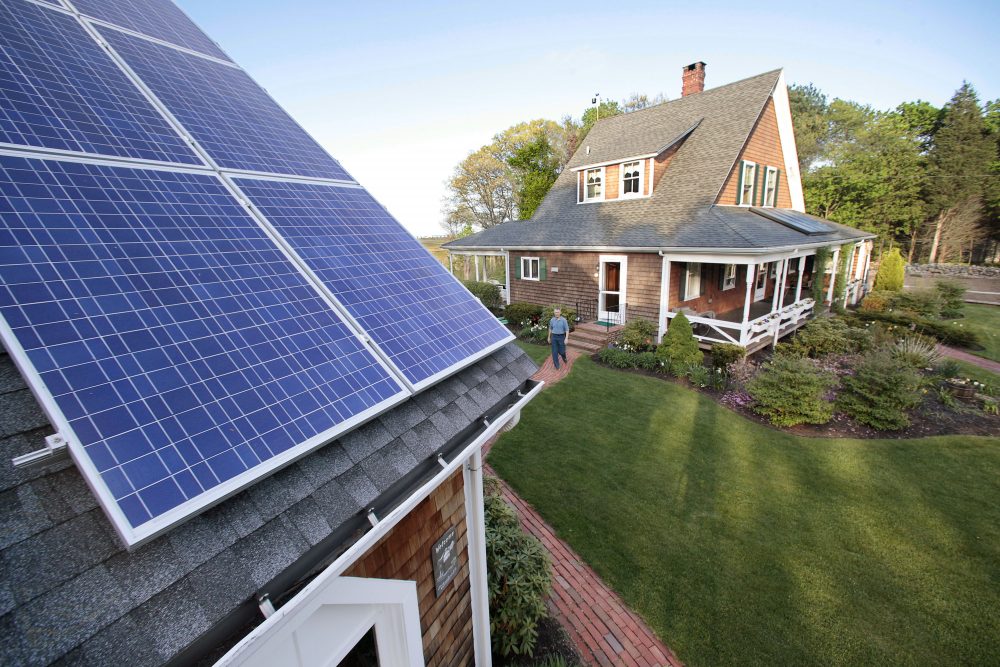Advertisement
Commentary
Power To The People: What’s Really Happening With Net Metering

When your neighbor puts solar panels on his roof, you have to help pay for them.
At least, that’s the narrative that electric utilities are advancing about how solar billing currently works. Eversource, which provides electricity for much of Massachusetts, earlier this year submitted for state approval its new plan that would impose higher costs on owners of solar panels. Now, cities and towns that have invested in solar energy are pushing back.
As Eversource tells it, customers with solar panels who zero out their electric bills by selling excess electricity back to the utility are getting a free ride on the cost to maintain the grid — the grid that those same customers rely on when the sun isn’t shining.
Massachusetts, like most states, has “net metering,” i.e., provisions that allow solar panel owners to be paid for the energy they generate in excess of what they use. Under the current rules, net metering customers in Massachusetts can avoid paying all electricity charges, thereby shifting the cost of maintaining the reliability of the grid to those without solar panels. That, say the utilities, is unfair.
But while the growth of solar power may benefit all ratepayers, it also threatens the growth and earnings of electric utilities.
The demographics of solar panel ownership sharpen their argument. A study reported earlier this year showed that the average household income of solar panel owners in four states (California, New York, New Jersey and Massachusetts) is around $100,000, which reinforces the “reverse Robin Hood” framing. The virtue-signaling suburban homeowner with solar panels on his roof and a Tesla in the driveway is, supposedly, being subsidized by the needy urban apartment dweller.
But there’s another side to the argument. A review by Brookings found a growing consensus that all electricity customers, regardless of whether they own solar panels, benefit from net metering. Analyses from around the country contradict the assertion that solar customers are raising costs for other ratepayers.
The reason the industry narrative doesn’t play out is that distributed solar power affects energy markets and infrastructure requirements. When solar installations deliver electricity at times of peak demand, it avoids firing up more expensive power plants that elevate wholesale energy prices. Additionally, the increasing fraction of solar generation in the energy mix limits the need to build new transmission lines and power plants. Then there's the economic stimulus — a recent report indicates there are 15,000 Massachusetts jobs in the solar industry.
And on top of that, there’s the reduction in greenhouse gas emissions that comes with solar generation. When analysts calculate the value of solar energy, they factor in the “social cost of carbon,” i.e., the economic impact of burning fossil fuels that contribute to climate change. The Trump administration has moved to eliminate this consideration at the federal level, but it remains relevant in states like Massachusetts that have passed laws mandating decreases in carbon emissions over the next few decades. In light of the legal requirement to decarbonize our economy, it makes sense to reward solar panel owners for helping the state reach its emission reduction targets.
But while the growth of solar power may benefit all ratepayers, it also threatens the growth and earnings of electric utilities. The state allows monopolies like Eversource to set their rates such that they can realize a fair return on the investments they’ve made in infrastructure, such as substations and new transmission lines to connect gas-fired power plants to the grid. Solar power produced by thousands of rooftop installations and municipal arrays doesn’t fit the model of centralized plants that utilities have traditionally depended on to make money.
The continuing growth of solar energy is forcing us to find answers to the business, economic and technological questions about our clean energy future.
Eversource finds itself in the uncomfortable position of trying to remain financially viable in an energy market that has been disrupted by solar and wind. Its proposed rate changes, not just for net metering but across the board, are facing popular resistance on multiple fronts. And besides the pending regulatory case, there are several new bills in the Legislature this session that aim to make the benefits of solar more affordable in less well-off communities and public housing projects.
The interaction of regulation and legislation makes an already complicated picture even more so, and the state government has the challenge of devising ways to satisfy all the stakeholders. But the transition to a fossil-free economy is inevitable, and lawmakers must keep in mind the need to rethink the outmoded energy policies of the last century.
So you should probably thank your neighbor for putting up those solar panels and moving things along in the right direction. The continuing growth of solar energy is forcing us to find answers to the business, economic and technological questions about our clean energy future.
